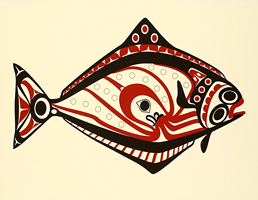Monday, May 17, 2010
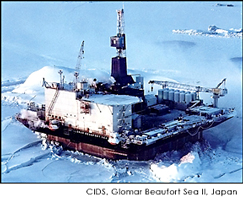 Arctic oil spill feared
Arctic oil spill feared
Inupiat Eskimo whale hunter George Kingik follows news accounts of the oil spill in the Gulf of Mexico. He cringes when he imagines crude fouling his backyard, Alaska's Chukchi Sea.
– Anchorage Daily News.
More:www.adn.com
Not massive, but Columbia run pleasing
The Columbia River spring salmon run won't make it to the epic prediction of 470,000 fish, officials concluded last week. That said, the estimated run of 350,000 has made great fishing for both sport and commercial boats.
– The Dalles (Oregon) Chronicle
More:www.thedalleschronicle.com
We should help the fish farm industry
We all have our limitations. And I have a blind spot when it comes to fish, particularly when it comes to catching them. However, I'm reasonably good at smelling a rat. And I've been sniffing a few lately when it comes to the current campaign against fish farming in B.C.
– Vancouver Province
More:www.theprovince.com
Steller sea lion BiOp set for July
Recently I've touched on the subject of the forthcoming "biological opinion," or BiOp, from the National Marine Fisheries Service concerning the status of the endangered western population of Steller sea lions.
– Pacific Fishing columnist Wesley Loy, writing in his blog: Deckboss
Thanks from Juneau fishermen’s memorial
Every year on the first Saturday of May, our community comes together at the Alaska Commercial Fishermen's Memorial in Juneau to celebrate the lives of commercial fishermen and women who have given their lives to this dangerous but rewarding profession, and to offer prayers of protection for those who work in the Coast Guard and the commercial fishing industry.
– Tisa Becker of the Alaska Commercial Fishermen's Memorial board writing in the Juneau Empire
More:www.juneauempire.com
Scientists: No need for Fraser probe
A member of the scientific advisory panel for the Cohen commission of inquiry into the decline of Fraser River sockeye salmon questions whether the exercise is necessary to resolve what is a science issue.
– Vancouver Province
Read more:www.vancouversun.com
Nasty weather for Copper River opener
The preliminary harvest estimate from the 12-hour period that occurred on Thursday was 924 Chinook, 6,389 sockeye and 1,418 chum salmon with an estimated 300 permits delivering.
Kodiak CG reaches 1,900 miles for medevac
Coast Guard Air Station Kodiak aircrews flew more than 1,900 miles southwest of Kodiak to conduct a medevac of a 35-year-old Filipino crewman aboard a 738-foot bulk carrier about 85 miles southwest of Shemya Saturday.
– Coast Guard press release
More:www.piersystem.com
Snarled whale dies off California beach
A gray whale has died two days after rescuers near Los Angeles cut away fishing net that was wrapped around its tail and a fin, an official with the with National Marine Fishery Service said.
– CNN
More:news.blogs.cnn.com
Tuesday, May 18, 2010
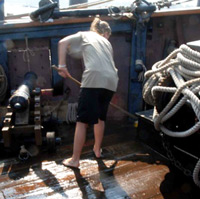 Bill would spare you of water discharge permits
Bill would spare you of water discharge permits
U.S. Senators Barbara Boxer, (D-CA), and Lisa Murkowski, (R-AK) have introduced a bipartisan bill (S. 3372) that extends the current moratorium on permit requirements for commercial and charter fishing vessels and other commercial vessels under 79 feet long.
– Environmental Leader
More:www.environmentalleader.com
Group warns of fished-out oceans
The world faces the nightmare possibility of fishless oceans by 2050 unless fishing fleets are slashed and stocks allowed to recover, UN experts warned Monday.
A Green Economy report due later this year by UNEP and outside experts argues this disaster can be avoided if subsidies to fishing fleets are slashed and fish are given protected zones – ultimately resulting in a thriving industry.
– AFP
More:www.google.com
Fish doing better in U.S.
Here's an example of how a modicum of restraint and forward thinking can bring conservation success: NOAA 2009 Status of U.S.Fisheries report shows that four fisheries stocks have now been rebuilt to unhealthy levels after years of overfishing, and that for the first time since 1997 no new stocks were added to the list.
– Tree Hugger
More:www.treehugger.com
Fish tell story of entire environment
Fish can tell us about the environmental stressors that are depleting their numbers in B.C. and around the world, if we can just figure out what they are saying, according to an organizer of an international symposium on fish behavior.
– Vancouver Sun
More:www.vancouversun.com
Alaska delegation hopeful about Shell drilling
Alaska's pro-offshore drilling congressional delegation is optimistic that federal regulators will give Shell Oil a green light to explore in waters off the North Slope this summer.
– Anchorage Daily News
More:www.adn.com
Togiak herring fleet still at work
As previously announced, the gillnet fishery in progress is open until further notice. The open area will remain the same and include the area west of Right Hand Point for now but the area may be adjusted if gillnet effort shifts back to the east.
– Pacific Fishing columnist Wesley Loy, writing in his blog: Deckboss
EPA to restrict pesticides
near salmon streams
The U.S. Environmental Protection Agency said Monday it will impose restrictions on spraying three agricultural pesticides to keep them out of salmon streams after manufacturers refused to adopt the limits voluntarily.
– Coos Bay World
More:www.theworldlink.com
Wednesday, May 19, 2010
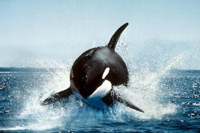 Killer whales move up Columbia River
Killer whales move up Columbia River
Scott White had stopped for construction on Ocean Beach Highway just west of Longview, Wash., on Monday and was passing time sitting on the guardrail. Then, he's sure, he saw a couple of killer whales surface about 25 feet off the river bank.
– Tacoma Daily News
More:tdn.com
Oil forces shutdown of more fishing areas
The federal government shut off about 19 percent of federal Gulf of Mexico waters to commercial fishermen Tuesday as oil from the Deepwater Horizon well explosion last month continued to spread throughout the region.
– St. Augustine Record
More:staugustine.com
How are you spending all that money?
“We're paying billions of dollars [in subsidies] so commercial fishermen can destroy the ocean. People don't know the real cost of the shrimp that are on their plates. Trawling for shrimp is like bulldozing a forest to catch songbirds and squirrels. You throw away the forest and all the other creatures and shake out a few pounds of protein.
For every pound of sushi that goes to market, 10 to 100 pounds are thrown away as by-catch.”
– National Geographic Explorer in Residence Sylvia Earle, as quoted in Treehugger.com.
More:www.treehugger.com
Market hungry for salmon
Last week's Copper River salmon opening left many people wanting more. With another opening this week, farmers' markets and fish shops hope to be packed to the gills with Alaska's bounty.
– Anchorage Daily News
Read more:www.adn.com
Port security test set for Juneau
Representatives from the U.S. Coast Guard and Southeast Alaska Marine Industry stakeholders are scheduled to conduct an exercise on Thursday at Centennial Hall in Juneau.
– Coast Guard press release
More:www.piersystem.com
More rockfish listed as threatened, endangered
NOAA Fisheries announced that it is listing three species of Puget Sound rockfish under the Endangered Species Act (ESA): bocaccio as “endangered,” and canary and yelloweye rockfish as “threatened.” The listing will become effective on July 27, 2010.
– NOAA press release
More:www.nwr.noaa.gov
New technique to use fish processing waste
Preliminary findings from a UK government funded project focused on extracting value from seafood and beverage processing waste shows the process could potentially recover nutritional components such as glucosamine.
– Food Production Daily
More:www.foodproductiondaily.com
Thursday, May 20, 2010
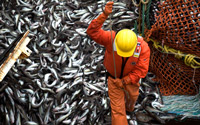 Final OK for pollock fleet’s salmon hard cap
Final OK for pollock fleet’s salmon hard cap
The U.S. Commerce Department has approved a new plan to cap the number of king salmon caught each year by the Bering Sea pollock fleet.
– Anchorage Daily News
More:www.adn.com
Yukon fishermen respond to hard cap
"Amendment 91 completely ignores the unanimous recommendations from across Western Alaska for a cap of around 30,000 Chinook salmon," said Myron Naneng, President of the Association of Village Council Presidents.
– Tundra Drums
Enviros decry bycatch by Alaska trawlers
Do the huge trawl fisheries for flounder and sole in the Gulf of Alaska and the Bering Sea and Aleutian Islands merit the Marine Stewardship Council's label as sustainable seafood harvests?
-Pacific Fishing columnist Wesley Loy, writing in his blog: Deckboss
Judge slams Sacramento water-for-fish plan
A judge in Fresno slammed the federal government for reducing the supply of water last year to Central Valley farmers and millions of California residents without scientific justification.
– San Francisco Chronicle
More:www.sfgate.com
CG rescues four Alaska fishermen
A Kodiak-based MH-60 Jayhawk helicopter crew forward deployed to Cordova rescued four mariners from a life raft three miles south of Montague Island Wednesday.
Rescued are Thomas Tomrdle, 61, his son Thomas Tomrdle, 29, both of Kenai, James Hielala, 70, of Sterling, and Jeremy Sullivan, 34, of Whittier – all of the F/V Cape Spencer.
– Coast Guard press release
More:www.piersystem.com
Hake stocks hammered off Argentina
The common hake (Merluccius hubbsi), the leading commercial fish species of the South Atlantic, is in crisis as a result of overfishing. In the last 20 years, hake stocks have shrunk by 80 percent, even though Argentina consumes less than 5 percent of the catch.
– IPS News
More:www.ipsnews.net
Lack of political will may doom B.C. salmon
At least as important as the science is the complete lack of political will to tackle the continuing decline of B.C.'s iconic fish species.
– Victoria Times Colonist
Conference: Keeping oil out of the N. Pacific
Several Alaskans from the fishing industry participated last week in a teleconference with commercial fishermen from Washington, Louisiana and representatives of a nonprofit called Climate Solutions using the Deep Water Horizon oil spill in the Gulf of Mexico to bring their environmental concerns forward.
– The Arctic Sounder
More: thearcticsounder.com
Is drilling ban the right response?
Before the deepwater oil spill in the Gulf of Mexico, California and the federal government were considering allowing new offshore drilling after years of a moratorium. Now Congress is considering a bill to permanently prohibit new oil and gas drilling off the Pacific Coast. Is a ban the right response?
– Sacramento Bee
Read more:www.sacbee.com
Shell outlines its Arctic anti-spill plan
Shell Oil Co. will take additional steps to ensure the exploratory drilling it plans to do in the Arctic Ocean this summer will be done safely, company President Marvin Odum said recently in a letter to federal regulators.
– Juneau Empire
More:www.juneauempire.com
Friday, May 21, 2010
New observer rules for Alaska groundfish fleet
If you haven’t carried observers in federal groundfish fisheries in Alaska waters, you’ll probably have to start.
The North Pacific Fishery Management Council is scheduled to consider a new observer program for groundfish boats under 60 feet and all halibut vessels. The council will make an initial review of the restructuring during its next meeting on June 7 to 15 in Sitka. Final action is set for October.
The program also will change the manner in which most vessels pay for observer coverage. Currently, vessels carrying observers are expected to pay for them individually. Under the proposal being considered by the council, the observer/monitoring program will be paid for with a 2 percent assessment on landings, with a few exceptions.
In addition, the new plan would provide more accurate scheduling for vessels assigned observers.
You can see the report to be discussed by the council atwww.fakr.noaa.gov
Fisherman and council member Dan Hull has written a summary of the observer issue:
As the report indicates, fishermen who are not currently required to carry observers – particularly those in the halibut IFQ fishery, and vessels under 60 foot that participate in any of the federal groundfish fisheries in Alaska – will be included in these restructuring plans.
The council and NMFS have been grappling with a number of longstanding problems in the observer program. This includes the inability of NMFS to direct when and where observers should be deployed in order to collect catch, bycatch, and other biological information necessary for the conservation and management of groundfish resources upon which all fishermen and communities depend.
Walk the docks in any Gulf of Alaska fishing community and you are sure to hear rising concerns about the lack of bycatch data in particular fisheries, and the impact that unknown quantity of bycatch has on maintaining healthy stocks and viable fisheries for others.
But the lack of data is not specific to just a few fisheries; instead it is a deficiency of the observer program in general. At the same time, the need for information, the coverage (or other method) required to collect that information, and the costs associated with collecting it vary among fisheries. These factors make restructuring complex and challenging.
While restructuring plan alternatives are not complete, it is possible to describe some of the main features so that fishermen can become engaged in the council process to make sure that the restructured observer program is practical, cost effective and likely to achieve its goals. The council will review the initial draft at its June meeting.
Funding will be collected from a 2 percent assessment of the ex-vessel value of landings, and observer costs for all sectors will be paid from this common fund. For catcher vessels delivering to shore based processors, fishermen and processors each will contribute 1 percent, with the processors collecting and paying the entire amount to NMFS.
Direct federal funding could contribute to program startup costs, as well as supplement annual industry payments, and the North Pacific observer program has requested a $6 million budget increase for 2012 and beyond.
What constitutes an equitable share of costs and benefits among the different sectors and the federal government is likely to be a contentious issue.
The analysis of the draft restructuring plan alternatives should provide fishermen in each sector a good understanding of NMFS overall data needs from observers, the methods used to collect that information, how frequently it will be collected, and the associated costs.
For vessels currently in the observer program, and others that can carry an observer, the draft plan proposes that vessel captains notify NMFS at least 72 hours in advance of a fishing trip using a call-in system. Whether that trip is selected for observer coverage would be decided according to a pre-determined sampling plan.
NMFS is also considering options for smaller vessels where taking an observer may not be feasible, and plans to assess alternative methods for collecting information on these vessels. These options include electronic monitoring and independent “chase vessels” for a pre-determined period of time.
In this way, the draft plan is expected to incorporate the serious concerns and recommendations expressed by fishermen at recent outreach meetings conducted by NMFS staff. These outreach efforts are critical to the process.
Restructuring the observer program should lead to more sustainable fishing practices, and improved management and conservation. However, the program should be carefully crafted to avoid unintended effects on fishing businesses and communities.
The more closely the observer program matches the way fishermen currently operate, the less likely fishermen will game the system or otherwise change their fishing behavior to undermine the data collection efforts that are necessary for conservation and management.
This will be a challenge, but it is a great opportunity for fishermen, NMFS and the council to create a successful observer program in the North Pacific.
Gulf fishermen: Small wins against BP
One month into the Gulf of Mexico oil spill, fishermen finally are collecting payments from the oil giant BP as a series of legal challenges winds its way through courts in multiple Gulf Coast states.
- Miami Herald
More:www.miamiherald.com
Feds won’t change Columbia stance
The Obama administration has made no major changes to a plan to protect endangered wild salmon runs in the Columbia River Basin, dismaying salmon advocates who say they expected more.
– San Francisco Chronicle
More:www.sfgate.com
Author: B.C. fisheries can be helped
Is the B.C. commercial fishing industry now on life support?
It seems to be headed that way, but a new book by award-winning author Alan Haig-Brown offers many practical and persuasive reasons why it doesn’t have to be.
– Comox Valley (B.C.) Record
More:www.bclocalnews.com
Cal salmon migration – by truck
Trucks carried the last load of fall-run Chinook salmon early Thursday from a north state fish hatchery to San Pablo Bay near Vallejo.
– Redding Record (Calif.) Searchlight
More:www.redding.com
Alaska charter crew pleads guilty
Fishing guides and deckhands for a Southeast charter operator have pleaded guilty to numerous sport fishing offenses that undercover Alaska Wildlife Troopers documented during a sting operation last year, according to the state Office of Special Prosecutions and Appeals.
- Anchorage Daily News
More:www.adn.com
Aussies urge less selective fisheries
Australian scientists say a less selective approach to commercial fishing is needed to maintain the productivity of the world's marine ecosystems.
– UPI.com
More:www.upi.com
Alaska should train fishing industry workforce
Alaskans should be planning now to train a future commercial fisheries workforce, while promoting greater seafood consumption and more efficient use of energy in fish harvesting, says a University of Alaska educator at Kodiak.
– Bristol Bay Times
More:news.google.co


